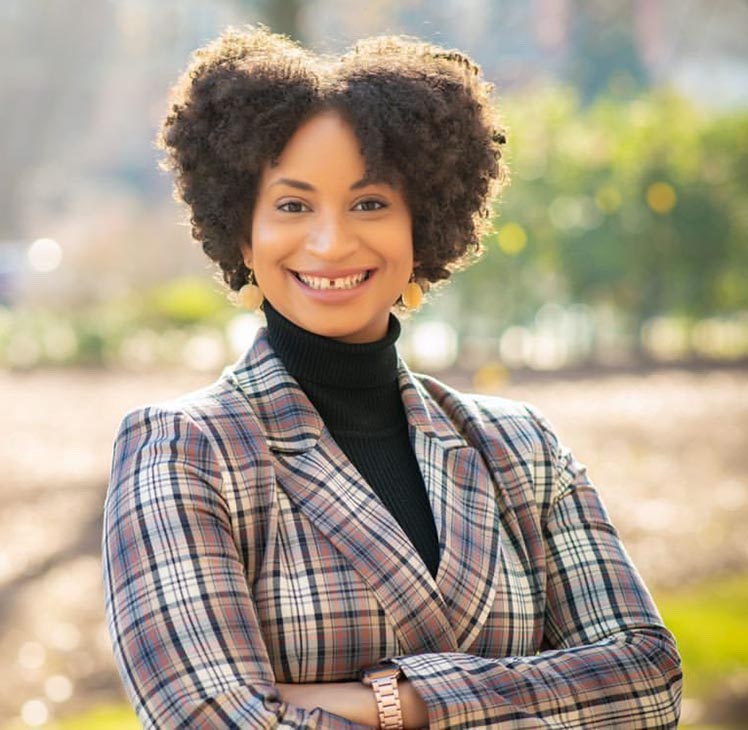Autumn Cabell: The support of faculty – ‘immeasurable’
Holmes Scholars Program provides access to a network of mentors

Autumn Cabell (Randell) earned her doctoral degree from the VCU School of Education’s Ph.D. in Counselor Education and Supervision program in spring 2020. She is also a member of SOE’s Holmes Scholars Program, which provides mentorship, peer support and professional development opportunities to students from historically underrepresented groups who are pursuing careers in education. In the fall, she will be joining DePaul University’s counseling program as an assistant professor.
What drew you to the field of education?
My own childhood experiences. I genuinely enjoyed going to school everyday because I viewed school as an escape, an opportunity to be around friends, and a place to learn. As I got older, I began to see education as a ticket to a different life for myself and a way to inspire those who will come after me. When I reflect back on my own educational experiences, it was the teachers who I could see myself in, that motivated me to do better and made me feel that school was a safe space.
During my time at Florida State University, it became clear to me that I wasn’t ready to end my educational journey with a bachelor’s degree. Given my love of education and my desire to be a champion for underrepresented students, I knew I wanted to go to graduate school for school counseling. My time working with high school students at a multicultural charter school in D.C. allowed me to see the barriers that minority students faced and the disparities in our education system. That experience fueled my desire to close the educational and opportunity gaps that I witnessed in the school system.
SOE’s Ph.D. in Counselor Education and Supervision program seemed like a natural next step to do impactful work challenging and breaking down the barriers I saw in my professional experience. I wanted to be a part of training the next generation of school counselors to be multiculturally competent and advocates for marginalized students. In addition, I knew the importance of research, and I wanted the opportunity to pursue a research agenda that would allow me to change the narrative surrounding minority students.
Is there anyone who inspired you to pursue study in this field?
Yes! Two Black professors, Dr. Steen and Dr. Pittman, in the counseling program at George Washington University inspired me to pursue the field of counselor education. I admired how they commanded the classroom and challenged students to critically reflect on the impact they had on their clients. My master’s program was the first time in my post-secondary experience that I had Black faculty members as instructors. Seeing them as academics made me believe that I too, could be a professor.
“I am most impressed with my program’s overall support, understanding, and encouragement. Throughout my time in the program, I always felt that the faculty cared about me and my success.”
Why VCU SOE?
I was sold on VCU SOE after my Ph.D. interview and campus visit. I was inspired by the opportunity to go to school in Richmond – an urban area with a complicated, yet important history. I appreciated that VCU SOE encouraged community-engaged work and that the faculty were advocates for diversity and inclusion.
What impressed you most about your program?
Now that I am at the end of my doctoral journey, I could not imagine completing my doctoral program anywhere else. When I reflect on my experiences and the opportunities offered to me, I am most impressed with my program’s overall support, understanding, and encouragement. Throughout my time in the program, I always felt that the faculty cared about me and my success. They genuinely and authentically wanted to see me reach my goals. The support of faculty in my program has been immeasurable.
Any tips for students who are considering entering your program at VCU SOE?
My first tip for students is to write down your “why.” Getting a Ph.D. can feel like a long and arduous process; it’s important to remember why you are here. When times get hard, frustrating, or overwhelming, pull out your “why” statement and reread it in order to reorient and refocus yourself.
Second, seek mentorship. There are a lot of different career paths and opportunities with a doctoral degree in counselor education. Talk to people, discuss your career goals, and learn about opportunities to further your interests. You might need multiple mentors for multiple, rich perspectives. It’s important to seek mentorship early because this time will go by quickly, and you want people in your corner early on.
Lastly, remember the importance of self-care. It’s important to get sleep, take breaks, eat, and do things outside of school with people that you love. Make taking care of yourself a priority from the beginning.
What have you enjoyed most about the Holmes Scholars Program?
I’ve enjoyed the professional development and mentorship that I have experienced as a result of being a Holmes Scholar. The Holmes Scholar program afforded me the opportunity to present at a national conference and learn about topics such as how to write a manuscript, how to develop a conference proposal, dissertation writing tips, etc. Holmes Scholars connected me with like-minded individuals with a variety of specialties and areas of expertise. In addition, the opportunity to learn from Dean Daire and Dr. Hopp has been instrumental to my success as a doctoral student.